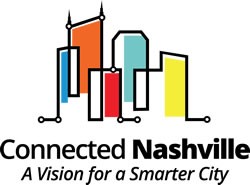Nashville’s digital inclusion efforts have always
A key foundation for this work was the Nashville Digital Inclusion Fund, launched in 2015 through a blend of public-private partnerships and generous donations. The fund, housed at the Community Foundation of Middle Tennessee, was created to address a pressing need—Pew Internet Research had reported that over 53,000 Davidson County families were being left behind in the digital age. To meet this challenge, the fund was established to provide free or low-cost internet access, devices, training, and support for Nashville residents. Metro Government kicked things off with a $100,000 investment in 2015, and partners like Google, the James Stephen Turner Family Foundation, and Comcast matched that contribution, bringing the fund to over $400,000.
As the founders of the fund stated, “This is the next logical step in Economic Development: building a workforce equipped for today’s jobs and ready for tomorrow’s.”
The fund supported a variety of initiatives, including Nashville’s Anytime Access for All program. This collaborative effort focused on providing devices and internet access to Metro Nashville Public School students and families who needed them most. Through partnerships with Vanderbilt University, ER2, ReviveIT, and Nashville Public Library, the program offered refurbished devices, tech support, and valuable training.
In the same year, Nashville was selected to join ConnectHome, a HUD initiative that aimed to expand digital resources for underserved communities. Building on the success of Anytime Access for All, the Metro Development and Housing Agency (MDHA) piloted a program in early 2016 to bring low-cost devices, affordable internet, free training, and tech support to residents in key MDHA communities, particularly those with K-12 students.
These collaborative efforts created a model for Nashville’s ongoing digital inclusion work, showing what’s possible when we come together to ensure that everyone in our community has the tools they need to thrive in today’s digital world.

Connected Nashville
In May 2016, a diverse group of 75 community leaders from Nashville’s business, academic, nonprofit, and government sectors came together to shape a long-term plan for making Nashville a smarter, more connected city. This Connected Nashville working group focused on Metro’s priorities, while also exploring global solutions to address local needs using technology and data, all with a commitment to equity at its core.
Even from the start, there was strong agreement on the need for data to drive successful planning. In August 2016, Metro CIO Durbin highlighted Nashville’s long-term digital inclusion goals in a presentation to a state committee, recommending a comprehensive digital inclusion assessment as one of the key strategies. Drawing inspiration from Austin’s Digital Assessment model, this recommendation became part of the Connected Nashville Education and Advancement Committee’s work, led by Dr. Wilson, and was embedded into Strategy 12.3 of the Connected Nashville report.
In August 2017, Dr. Wilson and Black in Tech Nashville hosted the city’s first Tech Inclusion Forum at Belmont University, with contributions from key partners like the Nashville Technology Council, the Nashville Area Chamber of Commerce, and Vanderbilt University. This event showcased the power of collaboration in advancing digital inclusion and access for all.
After nearly two years of dedicated work, the Connected Nashville: A Vision for a Smarter City report was published in October 2017. This initiative laid a foundation for the collaborative relationships that exist within the Digital Inclusion and Access Taskforce today.
